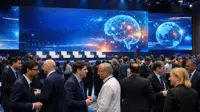India concludes free-trade talks with ASEAN
28 Aug 2008
 Mumbai: India has concluded free-trade talks with the 10-member Association of South-East Asian Nations (ASEAN), in a deal that would facilitate free trade in goods with the bloc.
Mumbai: India has concluded free-trade talks with the 10-member Association of South-East Asian Nations (ASEAN), in a deal that would facilitate free trade in goods with the bloc.
The agreement, however, only includes trade in goods and does not cover service trade.
Singapore's minister for trade and industry Lim Hng Kiang and India's commerce minister Kamal Nath announced the conclusion of trade negotiations at a news conference in Singapore.
India is already ASEAN's seventh-largest trading partner and the free-trade agreement covers additional goods covering billions of dollars in trade.
An official agreement is expected to be signed at the ASEAN's Bangkok summit due in December, senior commerce ministry officials said.
''This is an important milestone for our region,'' Nath said at the conclusion of the talks.
The India-ASEAN free-trade agreement will benefit more than 1.5 billion people and bring ASEAN closer to its key Asian trading partner.
ASEAN has also concluded free-trade negotiations with other Asia-Pacific trade partners such as Australia and New Zealand.
Agreements with these countries are expected to be signed at the ASEAN summit in Bangkok in December this year.
Nations are increasingly going for bilateral and regional trade deals after the world trade talks at Geneva failed as the US, India and China failed to agree on the to help breath new life into failed world trade talks.
The agreements with India, Australia and New Zealand will expand the ASEAN free-trade are to 13 nations comprising over 1.8 billion people and combined economic wealth of over $3 trillion.
Total trade between ASEAN and India amounted to $37 billion in 2007, up 29 per cent from the previous year.
Of the total 489 items on India's negative list, 288 are agriculture goods, 81 fall into the textiles sector, 50 are auto products and 70 are from the chemicals sector.
Items part of India's negative list are coconut, spices, natural rubber, cashew, fish and fish products, bananas, wheat, maize, rice, oils, processed food, poultry, milk and milk products, textile and textile products and auto products.
Fruits like bananas, pineapple, guava, mango, orange, lemon, grapes, water melon, papaya, apple cherries, grains like wheat, maize, rice, millet, groundnut, copra, oilseeds such as soyabean, cotton, sunflower, castor oil, sesamum and mustard seeds; beverages like beer, wine, whisky, rum, gin, vodka; tobacco and tobacco products, bamboo rattans, milk and milk products, fish and fish products, including tuna, shrimp, lobster and poultry and poultry products also fall into the list.
The FTA stipulates a reduction in India's duties levied on refined palm oil to come down from 90 per cent to 45 per cent by 2018. Duty on crude palm oil will also come down from 80 per cent to 37.5 per cent, and that on pepper would come down from 70 per cent to 50 per cent. Duties on black tea and coffee will come down from 100 per cent to 45 per cent.
Most of the trade will be liberalised by 2012, and by 2015, India would reduce duties to five per cent across 585 tariff lines. India and all 10 members would maintain a negative list of not over 489 tariff lines.
The commerce minister also said that it was is extremely important for India to engage in regional economic cooperation with the ASEAN countries, since economic giants Japan and China are already engaging with them, and India could ill – afford to isolate itself from regional trade cooperation.
Nath also said that India was amongst the first supporters of Japan's idea of a larger East Asia Economic Area when it was mooted three years ago. He said that East Asia is a globally competitive trading bloc, and has large markets with huge populations in Indonesia, Vietnam, China and India.
India is seventh on the list of ASEAN's biggest trading partners, trailing Australia, South Korea, China and others, according to ASEAN figures.
An India-ASEAN agreement covering trade in goods was supposed to have been concluded last year. Talks, however, bogged down over differences on products which India wanted excluded from tariff cuts. New Delhi had since pruned the list.


















